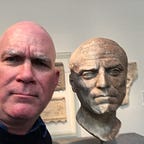Ask What Your Country Can Do For You
In his inaugural address, delivered on the steps of the United States Capitol on January 20, 1961, John F. Kennedy posed a challenge: “Ask not what your country can do for you — ask what you can do for your country.” His soaring rhetoric inspired a generation to devote their lives to public service.
Just kidding. After spending a few years in college being hippies, the Boomers became capitalists, and got rich. Those who volunteered for groups like the Peace Corps parleyed their brief stints in public service into high-powered careers … and got rich.
And guess what? Today, the country — through its government (our government) — is doing plenty for rich Boomers. Because they asked.
But first, consider for a moment JFK’s calling. He asked us to do two things: (1) don’t ask what your country can do for you; and (2) ask what you can do for your country. The latter is certainly a laudable ideal. Public service, neighbors helping neighbors, is probably among our highest callings. Note, of course, that it is a socialist idea. Giving of yourself so that others need not do without, marks a tradition collective selflessness that goes back to the early Christian church. (Doubt me? Consider Acts 2:44–45 “All who believed were together and had all things in common; they would sell their possessions and goods and distribute the proceeds to all, as any had need.”)
But no. We live in a capitalism. There is no profit in charity. The market will provide for all. So we can easily cast JFK’s second proposition aside as the benevolent musings of an earnest Son of Ireland.
How about JFK’s first proposition? Do not ask what your country can do for you. Why not? Rich Boomers seem to be asking a lot from their government. In 2019, $3.47 billion was spent on lobbying. Yes, some of that was by public interest groups, but their share is by far outweighed by corporate lobbying, with the solitary goal of increasing profits, not public interest. Is it legal? Sure. But consider that in light of JFK’s first admonition.
We have been raised to not ask for handouts, and to view those who do with scorn. It is endlessly fascinating though, to see this attitude gleefully reversed when it comes to corporate handouts. For instance, the United States subsidizes the oil industry — the same people we can thank for climate change — to the tune of $20 billion a year. Where are the handout haters when it comes to corporate welfare? The age-old argument is that subsidies create jobs. First, that is demonstrably false, subsidies only create increased profits. Even more though, from an economic standpoint, “trickle up” makes much more sense. If you give a poor person a thousand dollars, they’re going to spend every dime of it. That money will be recirculated into the local economy. Give a multinational corporation a billion dollars, and a good chunk of that money is going to bank accounts in Switzerland and the Cayman Islands, where it never again will see the light of day.
In other words: greed is bad (See Luke 12:15).
So why shouldn’t we ask what our country can do for us? It’s not like we don’t need anything that government can easily provide. Studies show that universal public healthcare is cheaper than for-profit employment-based insurance. Tuition-free college creates a better-educated workforce and allows the young to enter life debt-free, the social benefits are obvious. Then there’s the Green New Deal: shifting our energy priorities to clean power would (hopefully) halt climate change. In return it would generate billions of dollars in economic growth, and in the process, create millions of new jobs.
Yeah, maybe it’s about time we ask what our country can do for us. After all, it is our country. Isn’t it?
